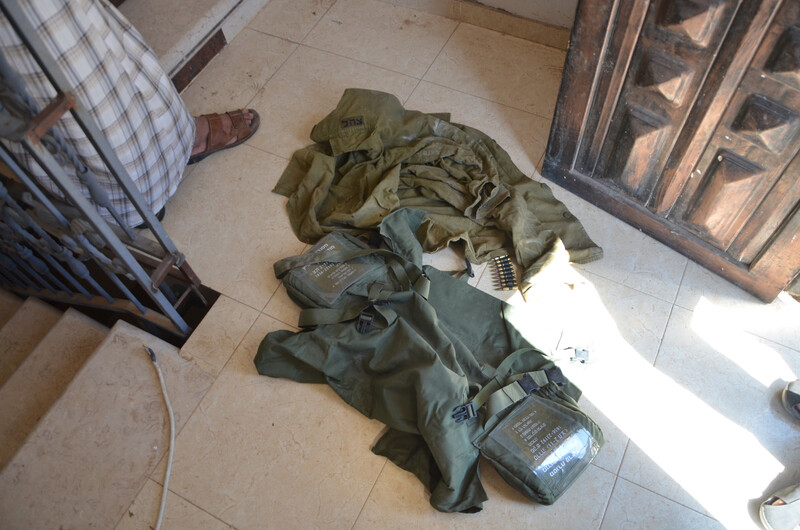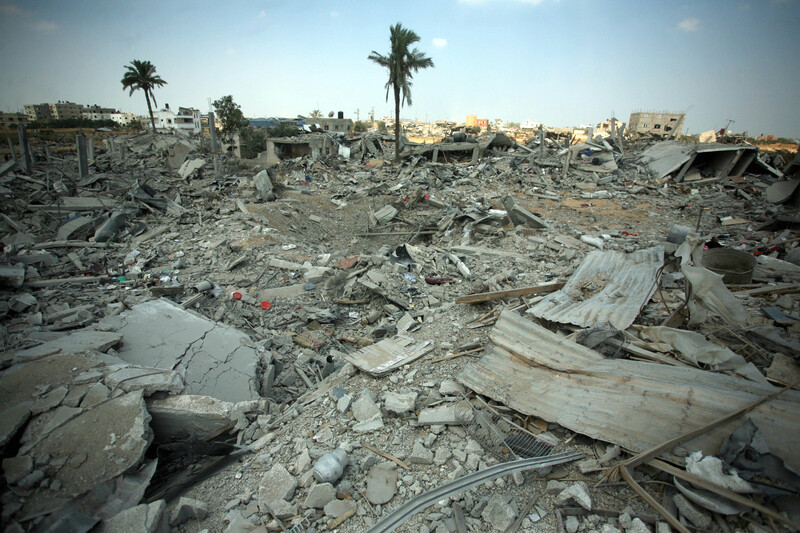The Electronic Intifada Gaza Strip 7 August 2014

Invading Israeli forces broke down the garage door of the Qdeih family home leading to the basement.
Muhammad Qdeih, 65, was shot dead while carrying a white flag to signal to Israeli soldiers that he was an unarmed civilian.
He was killed on 25 July right at the staircase of his house, where his daughter Mufida, a homemaker in her forties, stood speaking to The Electronic Intifada in the village of Khuzaa, east of Khan Younis in the southern Gaza Strip.
“They killed the man who taught me the meaning of devotion to the community and to the Palestinian cause,” Mufida said, gesturing towards the staircase. “He inspired me to take part in protests and solidarity events for prisoners.”
Down the stairs is the basement where the family and some neighbors had been hiding, seeking shelter from the Israeli onslaught.
Khuzaa was utterly devastated during Israel’s assault on Gaza which began on 7 July, and which paused for a 72-hour “humanitarian ceasefire” that was set to expire on Friday morning unless Israeli and Palestinian negotiators in Cairo were able to agree on an extension.
Inside the house, Israeli soldiers left evidence of their presence in the form of some of their gear, including a few bullets that had not been fired.
“About twenty years ago, my father used to collect vegetables and fruits and distribute them to the families of Palestinian prisoners from the area who are in Israeli jails,” Mufida said. “Though he loved Palestine, he refused to join any political faction, as he believed that Palestine is greater than any faction.”
“I was very close to my father, even though I am one of three daughters and six sons. Four of my brothers live in France and my father used to visit them there often,” Mufida said. “God have mercy on him. I cannot believe he has been taken by their criminal hands,” she said of the Israeli soldiers who killed him.
A doting grandfather to more than a dozen children, Muhammad Qdeih was a respected member of the community in the Abu Irjela neighborhood where he lived and died, about two kilometers from the fence separating Gaza from present-day Israel.
Even during the Israeli onslaught he thought about others.
“The day before he was brutally shot dead, my father asked me to help him donate two thousand euros he had received from his son Mahmoud in France,” Mufida told The Electronic Intifada. “He told me, ‘I would love to donate this money to help people around here, as the war situation is so desperate.’”
Killed carrying a white flag
Muhammad’s son Ramadan, 34, who witnessed his father’s killing, was inspecting damage Israeli tank shells had caused to the house of his uncle, also called Ramadan.
“Everybody in this neighborhood respected my father,” Ramadan said. “Many people asked him to be the chief of our tribe, but he refused, saying that he preferred to remain loved by everyone. But still, he was able to help sort out many family disputes.”
Ramadan told The Electronic Intifada what happened when Israeli forces invaded the area.
“Early on Thursday, 24 July, the Israeli air strikes and tank shelling continued unabated and about 45 people, including myself and my father, went out of the basement, as the house of my uncle Ramadan was hit by tank shells,” Ramadan recounted. “We headed for the entrance of Khuzaa town, yet the Israeli tanks were already around, so we had to go back to the basement.”

Occupying Israeli soldiers left behind equipment in the Qdeih family home.
“When night fell, we could hear the strikes getting more intense and at dawn on Friday, we heard the Israeli soldiers breaking the doors of the garage, which leads towards the basement,” Ramadan said.
“They shouted at us to come out and suddenly, a soldier stopped my father who went up first, holding a white flag. I was behind my father as the soldier ordered him to stay where he was and abruptly, the same soldier shot him in the chest, killing him instantly.”
Muhammad’s 22-year-old nephew Alaa was also there that day.
“I heard the soldier telling Ramadan that his father, my uncle, was taken by the soldiers for medical aid and that he was not dead,” Alaa said. “But a few hours later, we found my uncle laying dead in an a partially-built bathroom in the garage,” Alaa told The Electronic Intifada, while showing a photo of his uncle’s body on his mobile phone.
Killings of civilians in Khuzaa
The killing of Muhammad Qdeih was not the only such crime in Khuzaa. Human Rights Watch collected testimonies of other crimes in the village between 23 and 25 July in which Israeli soldiers “killed civilians in apparent violation of the laws of war.”
On the morning of of 23 July, Israeli forces ordered a group of approximately one hundred Palestinians in Khuzaa to leave a home in which they had gathered to take shelter. “The first member to leave the house, Shahid al-Najjar, had his hands up but an Israeli soldier shot him in the jaw, seriously injuring him,” according to the testimonies collected by Human Rights Watch.
In another incident on 25 July, Israeli forces shelled a basement where 120 civilians were sheltering, killing three.
The survivors fled and walked to Khan Younis, “carrying white flags and raising their hands when they came across Israeli soldiers. An Israeli missile strike hit one group of them, killing a man and wounding his cousin,” Human Rights Watch reported.

Israeli strikes destroyed swaths of Khuzaa village east of Khan Younis, photographed on 5 August.
Israel’s assault has so far left almost 1,900 Palestinians dead — one in every thousand residents of the occupied Gaza Strip. Each one had a life and a story that ended brutally.
Three months ago, Muhammad Qdeih left Gaza to pay a visit to his son Mahmoud in France. He had traveled abroad frequently, and, according to the family, lived for a spell in Spain, where he succeeded in obtaining citizenship.
“I feel very sorry and sad for the loss of my grandfather. He was so kind and tender to us all,” Iman Abu Rjaila, Mufida’s 18-year-old daughter, said.
“A month before the war on Gaza started, my grandfather used to call me every day from France to check on me as my high school exams were underway,” Iman said.
“Why did they kill him, why did they steal him from us?” she asked.
It is a question many bereaved and heartbroken families in the devastated Gaza Strip are posing as they wait to see what the days ahead will bring.
Rami Almeghari is a journalist and university lecturer based in the Gaza Strip.




